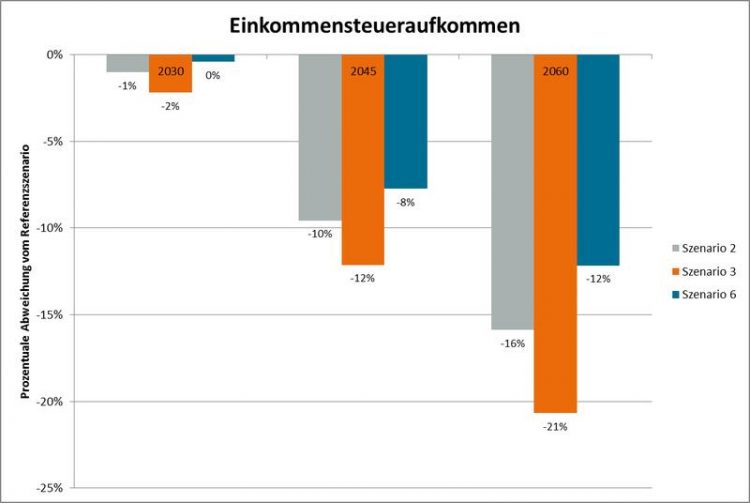Demographic change depresses tax revenues

By 2060, income tax revenues will be between 12 and 21 percent lower than in a scenario without demographic change, whereas sales tax revenues will be between 13 and 25 percent lower. © Fraunhofer FIT
In the next decades, population aging in Germany will accelerate and also induce a decline of the total population. These demographic changes can be expected to have a profound impact on the governmental budget.
While changes in public expenditures have been forecasted regularly since 2005, the revenue side has received less attention to date. A new study by the Fraunhofer Institute for Applied Information Technology FIT and the Prognos AG sheds light on the impact of demographic change on the future development of tax revenues.
The study focuses on the development of income tax revenues given a shrinking working population, but also considers sales tax revenues, which account for a similarly large share of total tax revenues.
Fraunhofer FIT quantifies income tax revenues in the years 2030, 2045 and 2060 using simulation models based on microeconomic data. Starting from a scenario without any demographic changes, the study distinguishes three possible paths for the development of the population in Germany. These correspond to the variants 2 (continuity), 3 (relatively old population) and 6 (relatively young population) of the official forecast of the Federal Statistical Office.
In all scenarios, the expected demographic changes are found to have a clear negative impact on both income and sales tax revenues. This holds especially true for the more distant future, when the population in Germany will not only be markedly older but also smaller than today. By 2060, income tax revenues will be between 12 and 21 percent lower than in a scenario without demographic change, whereas sales tax revenues will be between 13 and 25 percent lower.
Population aging increases the impact of various deductibility rules on total income tax revenues, in particular the impact of the deductibility of old-age and health insurance provisions. The tax code actually enhances the generosity of old-age provision deductions until 2040, whereas the taxable share of old-age pensions increases.
The income tax balance of this “deferred taxation” is negative and the problem is aggravated by demographic change. Due to expected increases in real incomes, however, demographic change does not imply an absolute drop in income and sales tax revenues in the next decades.
Link to the study (in German): http://publica.fraunhofer.de/eprints/urn_nbn_de_0011-n-4176903.pdf
Link to the summary of the study (in German): http://publica.fraunhofer.de/eprints/urn_nbn_de_0011-n-4176678.pdf
Media Contact
All latest news from the category: Business and Finance
This area provides up-to-date and interesting developments from the world of business, economics and finance.
A wealth of information is available on topics ranging from stock markets, consumer climate, labor market policies, bond markets, foreign trade and interest rate trends to stock exchange news and economic forecasts.
Newest articles

First-of-its-kind study uses remote sensing to monitor plastic debris in rivers and lakes
Remote sensing creates a cost-effective solution to monitoring plastic pollution. A first-of-its-kind study from researchers at the University of Minnesota Twin Cities shows how remote sensing can help monitor and…

Laser-based artificial neuron mimics nerve cell functions at lightning speed
With a processing speed a billion times faster than nature, chip-based laser neuron could help advance AI tasks such as pattern recognition and sequence prediction. Researchers have developed a laser-based…

Optimising the processing of plastic waste
Just one look in the yellow bin reveals a colourful jumble of different types of plastic. However, the purer and more uniform plastic waste is, the easier it is to…



